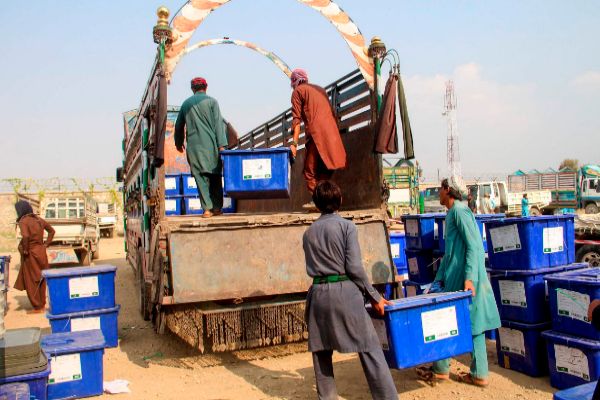"Voting? For what? No candidate is up to the task. None has solved our bad economic situation . There is hardly any work for young people," says the taxi driver Muyib. His words fall with aplomb while driving on one of the 'roads of death' in Kabul; flanked by embassies and official headquarters, it is one of the Taliban's favorite ways to remember, in blood and fire, that the war unleashed after 9/11 is not over yet . There are many more corpses ahead to cry.
Few scenes better define the moment when Afghans go to the polls to elect their future President: frustrated because the promised prosperity does not come while their political class collects corruption scandals, and fearful because fundamentalists, while killing, threaten to gain power . In fact, that possibility was close at the beginning of this month, until the unpredictable Donald Trump canceled the signing of a peace pact between the US and the Taliban favorable, according to Kabul, to the radicals.
The Taliban have threatened those who participate in elections that call "the American process." Electoral colleges, organizers and voters are in danger of death. "Afghan security forces have proven themselves ready for safe elections. We will focus on protecting civilians," emphasizes Abdul Moqim Abdulrahimzai, who is in charge of the iron security plan deployed for the elections. "To beat the Taliban, the best strategy is to support the Afghan government," he says.
The administration has not been on solid ground since the 2014 elections, when the US forced a coalition with the two main candidates, Ashraf Ghani and Abdullah Abdullah, to avoid a leadership crisis. This fact, coupled with the exclusion of the executive in the failed peace talks between Americans and the Taliban - a requirement of the Islamists - has projected the image of a dependent and weak power. Its leaders have contributed to it through a corruption scandal.
"To achieve a lasting peace, one must begin with seriousness. How? Starting from within Afghanistan, from a position of strength. If the Taliban see you weak, they will ask: 'Why should we negotiate with these?'. How to achieve that position of strength? With a strong government. How to achieve a strong government? Through a transparent electoral process , "concludes Ahmad Wali Masud, brother of the legendary Lion of Panyshir and one of the thirteen candidates for President.
Among the candidates, organized in lists of two or three partners supported by one or more parties, Ghani, of Pashtun ethnicity - majority -, and Abdullah, son of a Tajik, are the favorites. "Starting from previous results, we see how the vote is distributed according to ethnic boundaries , Pashtun vs. Non-Pashtun," explains analyst Thomas Ruttig, of the Afghanistan Analyst Network. "But, this time, we see quite mixed presidential lists," he warns, highlighting an incipient nationalist commitment.
The Electoral Transparency Foundation, one of the few entities that conducts surveys, foresees a slight advantage of Abdullah ahead of his biggest opponent, so he predicts that a second round will be needed . More attention is drawn to another figure in his report: only 42% of the 9.6 million registered voters are willing to vote. The disaffection and fear of potential voters can work in the hands of those who try to delegitimize the elections, including the Taliban.
"Afghans have seen too much fraud and expect more again," warns Ruttig. "Confidence in the democratic institutions of Afghanistan has fallen," he adds. "Low participation undermines the legitimacy of the elections, as it will if other candidates challenge the result. There will always be something to hold on to report fraud." Another denunciation of the candidates with less resources has been the lack of security, which has greatly limited campaign acts, especially in provinces.
And, in spite of everything, thousands of Afghans, although fed up with war and political weavings, will play their lives by going to vote. This Thursday, in the crowded bazaar, Yavad, a seller of traditional pakul caps, confirmed that he would vote but did not reveal to whom: "I want my country to progress and improve. We cannot achieve it if we do not participate in the elections," he reaffirmed. Not far away, a knife seller, Jalid, concluded that "it is best to have an opportunity to democratically choose our leaders."
Only Mohamed, a jeweler, exclaimed his preference: "I will support Ghani! He has managed to curb the influence of Iran and Pakistan, which damages our business so much, and has brought us some prosperity. Although some electoral enthusiasm is in the circles capitals, far from Kabul, especially in the provinces with a Taliban presence, the situation is far away. Abdulá, one of the transporters in charge of transferring ballot boxes and ballots to the polling stations across the country, says he will not even vote: "I travel by all of Afghanistan If the Taliban intercept me, and check in my voter card that I participated, they will kill me . "
According to the criteria of The Trust Project
Know more- Afghanistan
- Donald Trump
Afghanistan The Taliban lift the veto to the Red Cross
Afghanistan "Principle of agreement" between the US and the Taliban among piles of dead
AfghanistanTwo consecutive attacks leave 50 civilians dead in Afghanistan

